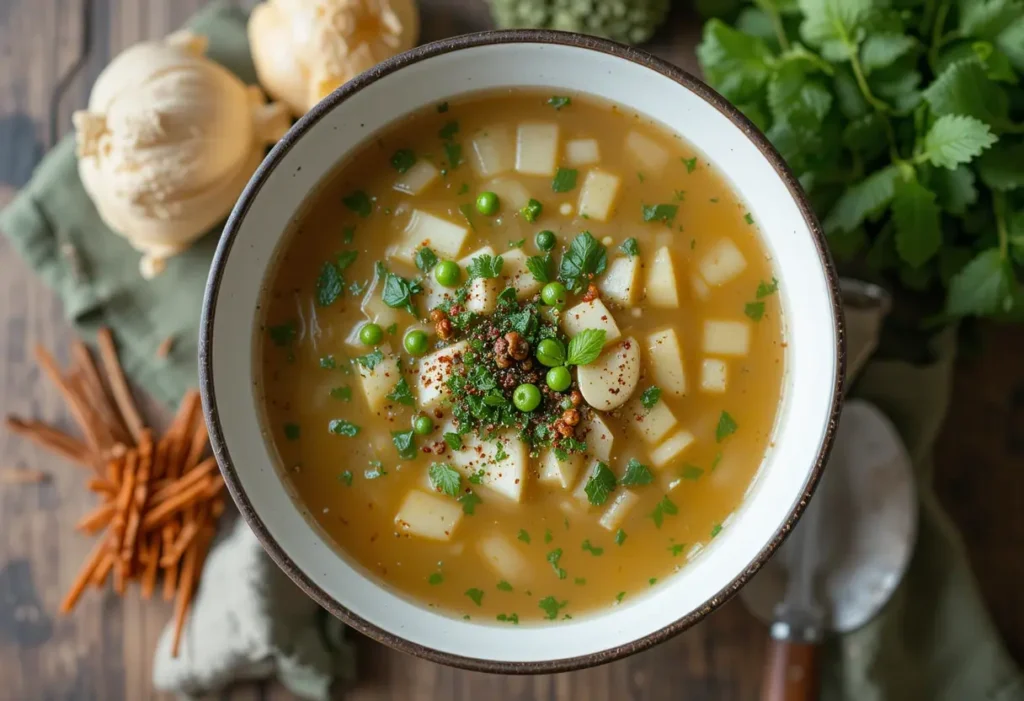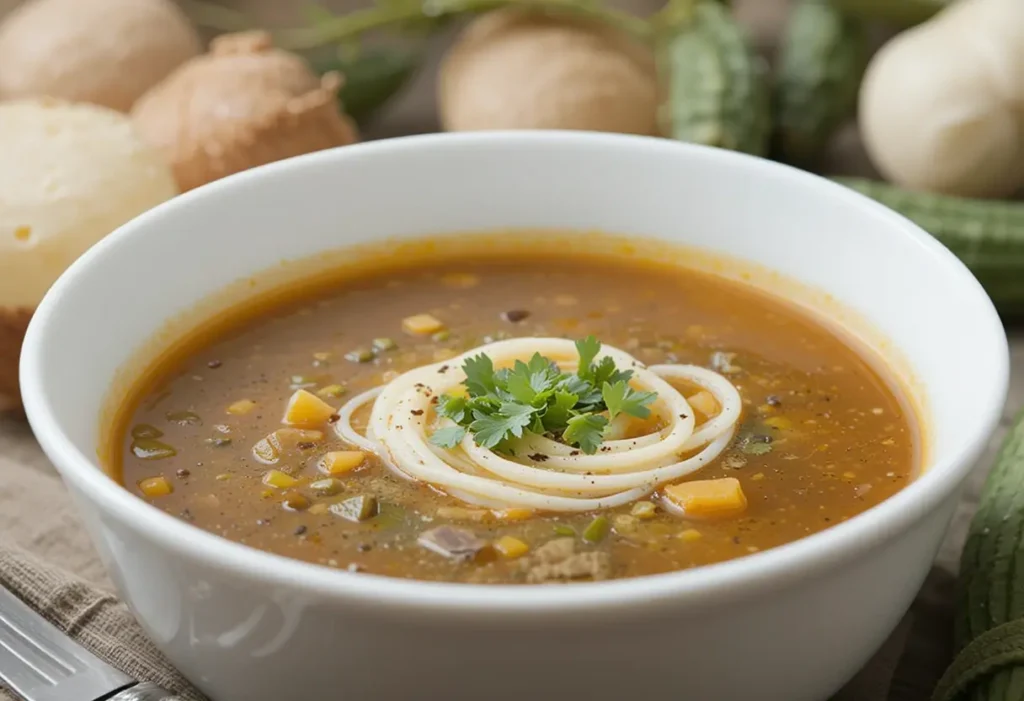When it comes to making a delicious bowl of soup, many chefs and home cooks alike wonder: what is the secret ingredient in soup? While there are countless recipes, the key to a truly memorable soup often lies in the secret ingredients that elevate its flavor. From the right broth to aromatic herbs and seasonings, discovering the secret ingredient in soup can turn a simple dish into a gourmet experience. In this article, we’ll explore the essential components that make up a flavorful soup, and reveal which ingredients are the most important in creating that irresistible taste.
The Key Ingredients in Soup
When we talk about soup, there are several core ingredients that contribute to the flavor profile. However, there is usually one element that serves as the backbone of any great soup. From the broth to the herbs and spices, each ingredient plays a vital role in making the soup memorable.
1. Broth or Stock – The Foundation of Flavor
The foundation of most soups is the broth or stock. These liquid bases are infused with flavors that permeate the entire soup. Broths can either be vegetarian, beef-based, chicken-based, or even seafood-based. A good homemade broth is often considered the secret ingredient in many soup recipes, providing a deep, rich flavor that can’t be replicated with store-bought options.
- Chicken Stock: Adds a light yet savory base to soups, such as in Chicken Noodle Soup.
- Beef Stock: Ideal for hearty, rich soups like Beef Stew.
- Vegetable Broth: A lighter, more delicate option that is perfect for vegetarian soups.

Want to learn more about what makes a good broth? Check out our article on What Does Potato Soup Contain?, where we discuss how the right broth can make all the difference in creamy potato-based soups.
2. Aromatics – The Flavor Enhancers
One of the most common secret ingredients in soup-making is aromatics. These ingredients include onions, garlic, celery, and carrots. When sautéed at the beginning of the cooking process, these ingredients release essential oils that infuse the soup with a rich, savory flavor. Aromatics form the base of flavor in many classic soups, like Minestrone or French Onion Soup.
Aromatics are versatile and can be tailored to the specific flavor profile of your soup. For example:
- Onions provide a mild sweetness and depth.
- Garlic adds a pungent and aromatic kick.
- Carrots and Celery add sweetness and earthiness.
If you’re preparing a comforting chicken dish, consider adding aromatics like those found in the Mississippi Chicken recipe. Aromatics combined with the right seasonings and cooking technique can transform a dish into something truly special. Learn more in our post on Mississippi Chicken Recipe: A Comfort Food Classic.
3. Acidity – The Balancer
While acidity may not be the first thing that comes to mind when you think of soup, it’s actually an essential ingredient in many recipes. A touch of acid—whether from lemon juice, vinegar, or tomatoes—can help balance out the richness of a soup, especially creamy or fatty ones.
For example:
- A splash of vinegar can bring brightness to a rich, meaty soup like Beef Barley Soup.
- A squeeze of lemon can lift the flavors in creamy soups such as Lemon Chicken Soup.
Acidity helps enhance the overall flavor profile, making the soup taste fresher and more balanced. It’s the reason why the acidity from tomatoes works so well in dishes like New England Clam Chowder, which pairs acidity with the creamy richness of the soup. You can find some inspiration in our article, Why is Clam Chowder So Popular in New England?.
4. Herbs and Spices – The Flavor Boosters
Herbs and spices are the real flavor boosters that take your soup from good to great. The right combination of herbs and spices can completely change the flavor dynamics of the dish.
Some commonly used herbs and spices include:
- Bay leaves, thyme, and rosemary for savory, earthy flavors.
- Cumin, paprika, and turmeric for warmth and depth.
- Coriander and parsley for a fresh finish.
Incorporating fresh herbs or dried herbs early in the cooking process releases their natural oils into the broth, making your soup more aromatic and flavorful. If you’re looking for a creamy, comforting dish, try pairing these spices with recipes like Buffalo Chicken Pasta. For more on herbs and spices, you can also check out our post, What is the Difference Between Corn Casserole and Cornbread?.

Additional Secret Ingredients that Elevate Soup
5. Umami-rich Ingredients – The Savory Boost
Umami is the fifth taste, often described as the savory or meaty taste. Adding umami-rich ingredients to soup enhances its depth and complexity. Ingredients that contribute umami include:
- Miso paste: Adds a fermented, salty, and earthy flavor.
- Soy sauce: A quick and easy way to boost flavor.
- Parmesan cheese: Adds a salty, nutty depth.
Using these ingredients in your soup can make a noticeable difference. For example, miso is commonly used in Japanese soups like Miso Soup and can add an incredible depth of flavor. Want to explore more about using umami ingredients in your cooking? Check out our article on What Sauce Goes Best with Salmon? for tips on using umami to complement seafood dishes.
6. Cheese – The Richness Factor
Adding cheese to a soup is another way to achieve a rich, creamy texture and flavor. Parmesan, cheddar, or Gruyere can transform a simple soup into something indulgent and hearty. A generous sprinkle of grated cheese can add both richness and a touch of saltiness.
Cheese is particularly useful in creamy soups like Potato Leek Soup or Broccoli Cheddar Soup. For instance, in Old Fashioned Cheesy Cornbread Casserole, the cheese plays a vital role in both flavor and texture, and can complement heartier soups like Chili.
7. Fats – The Mouthfeel and Richness
Fats in soups serve more than just a flavor purpose. They contribute to the mouthfeel, making the soup feel luxurious and smooth. Healthy fats like olive oil, butter, and even coconut milk can improve the texture of the soup while adding flavor.
Butter, for example, is commonly used to sauté the aromatics at the beginning of the cooking process. This creates a rich base that elevates the flavor of the soup.
The Importance of Simmering
No matter what the secret ingredient is, it is important to simmer your soup over low heat. Simmering allows the flavors to meld together, creating a harmonious dish. The longer a soup simmers, the more time the flavors have to develop, which is why soups often taste better the next day.
When you’re cooking your soup, remember that patience is key. Avoid high heat, as it can cause your soup to boil, resulting in a loss of flavors. Simmering ensures that all the secret ingredients have time to infuse and combine.
FAQs About Soup Ingredients
1. What is the secret ingredient in potato soup?
Potato soup often contains butter, cream, and cheese, but the secret ingredient for many recipes is a rich chicken broth that gives depth to the soup.
2. Can herbs be added at the end of cooking?
Yes, adding fresh herbs like parsley or cilantro at the end of cooking adds a bright, fresh finish to your soup.
3. What is the best way to add umami to soup?
To boost umami in soup, try adding ingredients like soy sauce, miso paste, or Parmesan cheese for a rich, savory flavor.
Conclusion
So, what is the secret ingredient in soup? The answer depends on the type of soup you’re making, but several ingredients, including broth, aromatics, acidity, herbs, and umami-rich ingredients, are critical in creating a flavorful soup. Experimenting with these ingredients and combining them in different ways will help you unlock the secret to the perfect bowl of soup


2 thoughts on “What is the Secret Ingredient in Soup?”
Comments are closed.